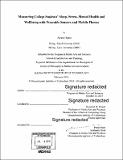Measuring college students' sleep, stress, mental health and wellbeing with wearable sensors and mobile phones
Author(s)
Sano, Akane
DownloadFull printable version (18.45Mb)
Other Contributors
Program in Media Arts and Sciences (Massachusetts Institute of Technology)
Advisor
Rosalind W. Picard.
Terms of use
Metadata
Show full item recordAbstract
This thesis carries out a series of studies and develops a methodology and tools to measure and analyze ambulatory physiological, behavioral and social data from wearable sensors and mobile phones with trait data such as personality, for learning about behaviors and traits that impact human health and wellbeing. This thesis also validates the methodology and tools on a selected subset of the questions that can be answered by the data collected. First, I conducted a study to characterize wrist electrodermal activity (EDA) patterns with concurrent polysomnography and conventional palm EDA measurement. I developed a tool to analyze the EDA data quantitatively and found that wrist EDA peaks occur during Non REM2 and 3 sleep. Then, with multi-modal wearable sensor data, I conducted several studies showing how multi-modal wearable sensors can improve characterization of sleep/wake states over motion-sensing alone, and predict sleep-related memory consolidation. We found that wrist-EDA helps discriminate when there is improved sleep-related memory consolidation. Next, with colleagues at MIT and Brigham and Women's hospital, I designed and carried out the first four semesters of the "SNAPSHOT study", which measured over 100,000 hours of multi-sensor and smartphone use data from 168 college students, recruited together with their social groups. Each student contributed intensive multi-modal ambulatory data (physiological, behavioral, environmental, and social) for 30 days. Each student also filled out standardized questionnaires on mental health, personality, stress, social interactions, sleep and GPA, and provided a measure of dim light melatonin, enabling circadian phase to be measured. To investigate the value of the data, I examined a subset of the large set of questions that these new data enable us to answer: I examined the associations between sleep regularity and sleep duration on academic performance, physical/mental health, perceived stress and wellbeing-related measures using coarsened exact matching to control covariates. Our data showed that sleep irregularity was statistically significantly more associated with bad health, reported in the morning, and with worse mental health than sleep duration. I also identified features useful for recognition of monthly reported perceived stress (high vs low): daily activities, personality, sleep, physiology, social interactions, phone usage, and mobility.
Description
Thesis: Ph. D., Massachusetts Institute of Technology, School of Architecture and Planning, Program in Media Arts and Sciences, 2016. Cataloged from PDF version of thesis. Includes bibliographical references (pages 165-182).
Date issued
2016Department
Program in Media Arts and Sciences (Massachusetts Institute of Technology)Publisher
Massachusetts Institute of Technology
Keywords
Program in Media Arts and Sciences ()